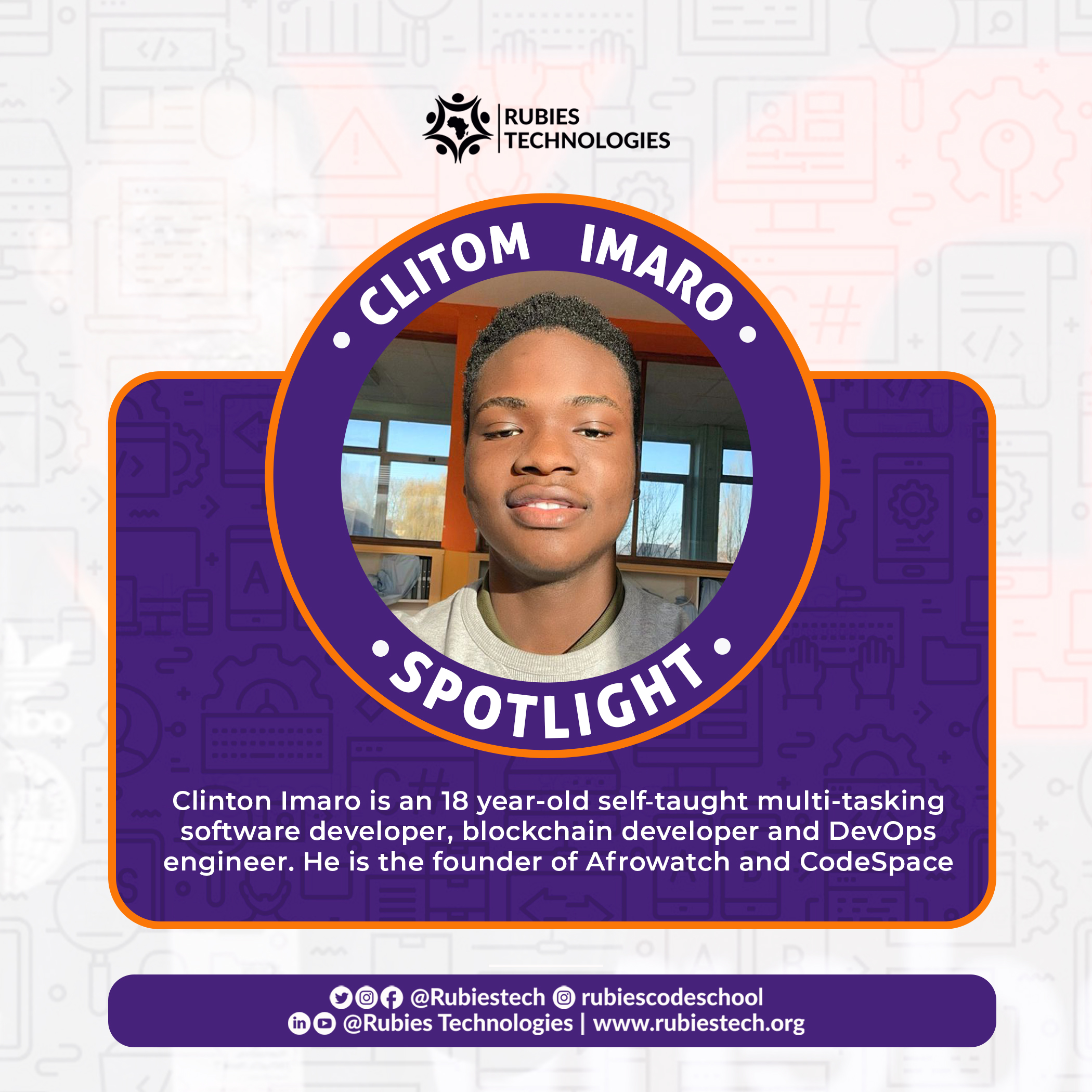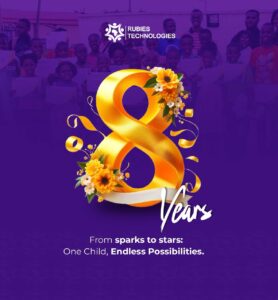Clinton Imaro is an 18-year-old self-taught multi-tasking software developer, blockchain developer and DevOps engineer. He is the founder of Afrowatch and CodeSpace. He took us through his journey into tech, his challenges and how he plans to impact the lives of young people going into tech but lack the resources
Excerpts…
Can you tell us more about yourself?
Clinton: My name is Clinton Imaro. I’m a multi-tasking software developer, blockchain developer, DevOps engineer, and I’m also into cyber security.
When did you get into tech?
Clinton: I got into tech properly in 2017, when I was 12 years old. Like I always say, before then, I was into the tech space, just like so many people today are, but they just feel like they are not doing as much as others. So I was that type of person back then, Before 2017, I was into the tech space, but I was not doing much and I was not into programming. It was in 2017 that I really took the bold step I going into programming fully and then into the tech space.
What are the things that motivated you to go into something like tech?
Clinton: What motivated me was actually the uniqueness of tech, because then my uncle usually tells me that all these games I am playing (I love playing games) that I can develop them myself without playing someone else’s game. So he kept on telling me every time, so I just decided to say, “Okay, let me give it a try.” So at first, it wasn’t interesting for me. Let me just say the first few weeks were like, “What the hell am I really learning?” So later, I actually piqued my interest in it and I decided to move further
Also, what actually prompted me to go into tech is that I love solving problems. Before 2017, I always picked out all these homemade materials and use them to develop or innovate things which is actually solving a particular problem. So with the tech aspect and programming, I feel like if I combine those two together, I can actually solve problems in the society. There are lots of things that need to be done.
Before you actually transitioned into tech, what was your future ambition?
Clinton: Growing up, I always wanted to become a doctor. But along the line, when I went into the innovation aspect of tech, I decided to make a pursuit of it and said I wanted to become an electrical engineer. But along the way, I decided to just go for computer engineering, and now computer science which is currently okay.
Were you in secondary school when you started this journey?
Clinton: Yes, I was in secondary school
How were you able to manage your coding and school together?
Clinton: It wasn’t easy at all, but I feel like if you have the determination and know what you are pursuing, you could actually scale it through. There’s a way you can really find your way around it. Growing up, I never had a calendar or to-do list. I just do everything and combine everything together, and by doing these things, I was depriving myself of going out, and that is why you don’t see me at so many social gatherings. So I prefer to stay inside, do my research, and build products that can actually solve problems in society rather than spending most of my time outside.
What I do most of the time is when I wake up in the morning, I try to write a few codes and do some research, then go out there, have a productive day and come back to it. I prefer coding in the morning and early in at night, while during the day, I focus more on my school
As a young tech person, what are the challenges that you faced when you started?
Clinton: There are a lot of challenges, like the aspect of you living in Nigeria and the standard challenge that most people face, is electricity. We don’t get constant electricity and internet connections, which was also a big challenge for me back then when I was starting. Also, I had a major challenge that really weighed me down for a couple of years before I was actually able to pull it out. For me, it was the fear of actually showcasing or even marketing myself. So back then I did a lot of stuff, but I just put them on eBay, so I didn’t show them out. I don’t market myself, which is one thing that, if you don’t start at the early stages while going fully into the tech space, it’s going to weigh you down. You need to market yourself and be a little bit social. So there are so many challenges, but these are the ones that actually weigh me down, and I can’t do anything about it.
How did your parents react when you start coding?
Clinton: It was actually normal, like I said, I wasn’t into tech, it was my uncle that encouraged me. When he came up with the idea, I was okay with it. He reached out to my mum and she was okay with it. The flow just went on. Everyone gave their full support. My mum is aware that I am interested in technology, but that hasn’t stopped me from studying. I am not the type of guy that focuses on tech and throws his books away.
Which programming languages are you proficient in, and which was challenging when you started learning?
Clinton: I am proficient in Java, Javascript, HTML, CSS, React and React Js, Python, and Flutter. I am a blockchain developer and Devops engineer, and so many programming languages I do use, especially when it comes to blockchain development, I do use Solidity. I am proficient in a lot of them. The one that was a little bit challenging for me when I started was React. At first, it was really confusing, but I pushed through. I was stressed because I am a self-taught programmer; I code in six programming languages other than the one I use in blockchain, and five of those six programming languages are self-taught. I feel like React and Flutter were really challenging, but I got myself together when I realised this is what I needed to do.
What was a project you did that was challenging?
Clinton: A project I did that was challenging for me then was a school management system because that was when I started programming, I started with Java basics GUI and some others. So I decided to build a full school management system, and then I wasn’t having a laptop and I can’t wait anymore, so I took a full notebook and decided to start writing my codes in that book even though it was not correct until I got my first laptop then I moved those codes to the system and tested it. I got some errors which I was able to solve and at the end of the day, my school management system was ready
Take us through your problem-solving process
Clinton: I actually define the problem I want to solve, and after I am done with that, I go about making research on the problem I want to solve to see if someone has done it before and get a few ideas on how the one I am building will solve the exact problem I want to solve. After that, I go about analysing that problem before I go about developing a solution to it. After the solution, make more implementations.
Tell us about Afrowatch and Code Space
Clinton: Afrowatch is an online streaming platform that enables you to watch local and international TV channels for free and also lets you watch more with less data consumption. The idea came to me a couple of years ago when I was trying to watch a match and couldn’t find a site where I could watch it. Then my uncle would always go to the viewing centre to watch matches, but I would stay at home. Then I decided to do something because if I want to use my mobile data to watch those matches, it will consume a lot of my data. That was how I started working on it, and I called someone, whose name is Precious. He is very good, and that is how we built the Afrowatch. Afrowatch is fully done, and I am waiting to put it on my private release because we have more than 1000 people on the waiting list.
Code Space is a community in Africa for people in the tech space, whether you are a graphic designer, a programmer, or anything related to tech. We are a community of teenagers that are willing to rewrite the African narrative with technology. These are teenagers who are looking forward to gaining more knowledge, internships, and more. It’s like a Non-Governmental Organisation. We are building a tech space for teenagers and Gen Z. I am currently building a SmartKlass which I won’t be giving updates yet
If you were to use technology to solve one problem in Nigeria, what would it be?
Clinton: What I would love to use tech to solve is corruption in Nigeria, because it’s like the first symbol that comes to mind when you tell people you’re from Nigeria. Also, if I had the opportunity, what I would love to do is build a secured and decentralised online platform where every citizen of Nigeria can cast their votes. Where you don’t need to go to polling units where you hear stories of someone who got shot or injured, and at the end of the day, we are still getting bad government. There are many problems I would really love to solve with tech in Nigeria
Do you have a mentor?
Clinton: No, but there are individuals I still look up to that one day, I will get to this stage where the person is currently at
Where do you see yourself in the next five years?
Clinton: I see myself making waves in the tech space, I see myself helping others who want to get into the tech space but are having financial problems or because of laptops. I see myself in many things, executing the future in the next 5-10 years
Do you think young people are getting full support?
Clinton: No, I don’t think our young people are getting the right support that they need, and that is why you see a lot of our young people being exported out of Nigeria to a country that will appreciate their talents, but our country is not able to appreciate those talents.
That is why you see young tech prodigies being taken to the US, UK ,Canada and other countries. I feel like they actually need to meet these young people in the tech space who are doing great stuff. They need to show their support. There are so many people out there who have the platform to show those talents, but they refuse to do so.
I remember when I started, I would just post something, and feel like tagging those people I was looking up to, but you see them not reacting, and sometimes it makes me wonder. We are humans too; you don’t need to help these young people financially before you can assist them. Even if it is to appreciate and encourage them, it will go a long way. Imagine a tech bro who just started and made a beautiful website and tagged a celebrity; If that celebrity was able to comment or retweet that post, give that boy 2-3 years and you will see him making waves; if he keeps tagging but doesn’t get the support, he can decide to back down and focus on something else after one year. If we get those support, it will go a long way and start utilising our talents in our country instead of allowing other countries to take our talents away.
What Advice do you have for parents?
Clinton: My advice to parents is to support their children in all ways. Don’t say my child must become a doctor or lawyer, don’t force them to become those things if their mind is in the tech space. Please encourage them, and support them so they can come into the tech space and excel, that is what parents want for their children. Together, we can change the world and right the wrongs our government has done. Tech is the future. If your child wants to go into tech, you should be happy because this is like a game-changing process.
I believe if I didn’t have support from my parents, I wouldn’t be where I am today.
When I told them I wanted to be a doctor, they were completely supportive, and when I told them I wanted to be an electrical engineer, they were equally supportive. It has really been fast. So encourage your kids going into tech and give them your support if possible
The Rubies Technologies Kids spotlight is the initiative of our organisation to showcase young ones going great works in the tech field but need more visibility. Do you know any kid that is going great stuff in the tech field and you want us to feature him/her? Kindly contact Rubies Technologies info@rubiestech.com



